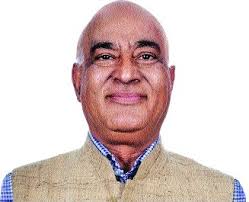Does being local matter? Administrative decentralisation and human development
In this post, Chaudhary and Iyer discuss the administrative decentralisation reforms brought about by the Panchayati Raj Act, and measure the effect of decentralisation on the provision of public serv...
-
 Latika Chaudhary
Latika Chaudhary  Lakshmi Iyer
Lakshmi Iyer  13 January, 2023
13 January, 2023
- Articles
The panchayat asset register: An instrument to conserve India’s commons
With common lands making up nearly a quarter of Indian territory, the State has taken steps to protect them from encroachment. The Indian Constitution grants panchayats custodial rights to protect vil...
-
 Pooja Chandran
Pooja Chandran  Subrata Singh
Subrata Singh  07 December, 2022
07 December, 2022
- Perspectives
DUET: Decentralise employment generation to urban local bodies
Dilip Mookherjee supports Drèze’s suggestion to decentralise employment generation to urban local bodies, and contends that the moribund nature of urban local government is a key reason for the neg...
-
 Dilip Mookherjee
Dilip Mookherjee  14 September, 2020
14 September, 2020
- Perspectives
When criminality begets crime: The role of elected politicians
The criminalisation of politics has become a massive threat to society. While the impact of criminally accused leaders on economic outcomes has been studied in the literature, little is known about th...
-
 Nishith Prakash
Nishith Prakash  Soham Sahoo
Soham Sahoo  Deepak Saraswat
Deepak Saraswat  Reetika Sindhi
Reetika Sindhi  19 March, 2021
19 March, 2021
- Perspectives
Regionalist party representation and tribal insecurity
Observers have long been ambivalent about regionalism as a principle underlying the organisation of politics. Analysing data from India, this article shows that when regionalist parties win elections,...
-
 Sacha Kapoor
Sacha Kapoor  Arvind Magesan
Arvind Magesan  19 February, 2021
19 February, 2021
- Articles
Combating corruption and illicit outflows: A welfare-oriented approach
A discussion of the association between corruption in economies and leakage through illicit outward flows – with important implications for welfare – is missing in the literature. Based on a theor...
-
 Swapnendu Banerjee
Swapnendu Banerjee  Siddhartha Mitra
Siddhartha Mitra  Vivekananda Mukherjee
Vivekananda Mukherjee  17 December, 2020
17 December, 2020
- Articles
Land disputes in ‘Santhal Parganas’: Issues and solutions
Four of the six districts in Santhal Parganas division of Jharkhand have been classified as ‘aspirational districts’ by NITI Aayog. In this note, Karn Satyarthi describes the unique manner in whic...
-
 Karn Satyarthi
Karn Satyarthi  15 December, 2020
15 December, 2020
- Notes from the Field
Ethnic identities, public spending, and political regimes
Do democracies discriminate less against minorities as compared to non-democracies? How does the dominance of an ethnic group affect discrimination under various political regimes? Presenting a theore...
-
 Sugata Ghosh
Sugata Ghosh  Anirban Mitra
Anirban Mitra  07 December, 2020
07 December, 2020
- Articles
Diversity and public goods: Why the geographical unit of analysis matters
Research has shown that regions with higher caste diversity have lower share of villages with essential public goods. This article challenges this finding and shows that empirical models estimated at ...
-
 Naveen Bharathi
Naveen Bharathi  Deepak Malghan
Deepak Malghan  Sumit Mishra
Sumit Mishra  Andaleeb Rahman
Andaleeb Rahman  23 November, 2020
23 November, 2020
- Articles
Does the right to vote affect political behaviour? Historical evidence from India
Democracies are known to have better economic development outcomes over the longer run. However, it is not clear whether giving citizens the right to vote is sufficient for ensuring an effective degre...
-
 Guilhem Cassan
Guilhem Cassan  Lakshmi Iyer
Lakshmi Iyer  Rinchan Ali Mirza
Rinchan Ali Mirza  17 November, 2020
17 November, 2020
- Articles
Digging for dirt: Rent-seeking among elected politicians in India’s mineral belt
The Indian mining industry is no stranger to corruption scandals and every year dozens of environmental activists are murdered for exposing illegal mining activities. This article discusses the impact...
-
 Samuel Asher
Samuel Asher  Paul Novosad
Paul Novosad  10 November, 2020
10 November, 2020
- Articles
DUET: Decentralise employment generation to urban local bodies
Dilip Mookherjee supports Drèze’s suggestion to decentralise employment generation to urban local bodies, and contends that the moribund nature of urban local government is a key reason for the neg...
-
 Dilip Mookherjee
Dilip Mookherjee  14 September, 2020
14 September, 2020
- Perspectives
Synchronised elections, voter behaviour, and governance outcomes
An active policy proposal of the Government of India is to hold national elections at the same time as the assembly elections of all the states. This article examines whether holding national and stat...
-
 Vimal Balasubramaniam
Vimal Balasubramaniam  Sabyasachi Das
Sabyasachi Das  Apurav Yash Bhatiya
Apurav Yash Bhatiya  28 August, 2020
28 August, 2020
- Articles
Citizen-State relations: Countryside and city
To what extent do citizens expect officials to respond to local problems, and how do they make demands on the State to advance their well-being? Based on surveys in Madhya Pradesh and Rajasthan, this ...
-
 Adam Auerbach
Adam Auerbach  Gabrielle Kruks-Wisner
Gabrielle Kruks-Wisner  24 August, 2020
24 August, 2020
- Articles
Does political reservation work, and for whom?
Does political reservation undermine or promote development, and for whom? This article presents an analysis of India’s Scheduled Areas, which reserve political office for the historically disadvant...
-
 Saad Gulzar
Saad Gulzar  Nicholas Haas
Nicholas Haas  Ben Pasquale
Ben Pasquale  11 August, 2020
11 August, 2020
- Articles
Twitter feed
Tweets by Ideas4IndiaMost Popular Governance Posts
Unique Health Identification and Aadhaar: A case for mandatory linkage
As part of the Digital India initiative, All India Institute of Medical Sciences (AIIMS) issues a Unique Health Identification (UHID) number to each patient, which documents their entire journey in th...
 Mudit Kapoor
Mudit Kapoor  23 December, 2016
23 December, 2016
- Perspectives
Caste dominance in rural India: Cause and effect
Rural India remains a caste-based society. This column explores why caste continues to play such an important role and what the effects are. It argues that trade and agricultural productivity suffer, ...
 Siwan Anderson
Siwan Anderson  16 August, 2012
16 August, 2012
- Articles
Why did the Indian economy stagnate under the colonial rule?
How did the Indian economy fare under the colonial rule? Is the average Indian significantly better off after Independence? This column examines trends in GDP per capita in order to determine the stan...
 Aniruddha Bagchi
Aniruddha Bagchi  16 September, 2013
16 September, 2013
- Articles





 29 March, 2023
29 March, 2023






